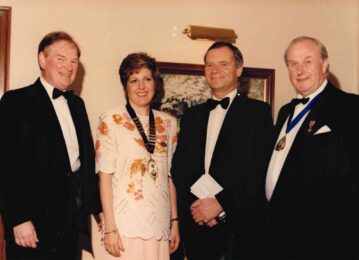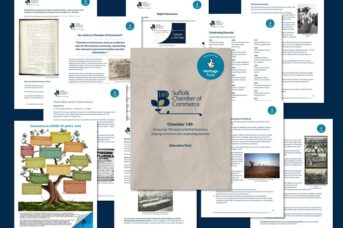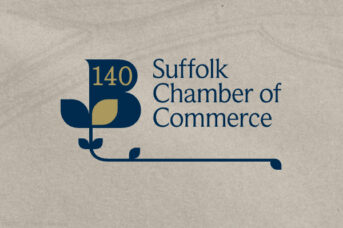In a recent interview, Annette Whybrow shared her incredible journey to becoming the first woman president of the Suffolk Chamber of Commerce in Ipswich in 1993.
This was a huge milestone for the Chamber, marking a significant shift for women in business in Suffolk. Her presidency ushered in a period of exciting growth and international engagement for the Suffolk Chamber.
Career Beginnings and Breaking Barriers at the Suffolk Chamber
Annette’s career began in London, where she trained as a solicitor specialising in corporate and company law. In 1980, she married and moved to Ipswich, soon becoming a partner at the law firm Westhorpe Ward & Catchpole, now known as Birketts LLP – an esteemed Chamber patron.
Recognising that networking was crucial in the business world, Annette joined the Chamber of Commerce to build connections with the Suffolk business community.
What stood out in our conversation was Annette’s sheer determination to succeed. In the same year she joined the Chamber’s executive committee – becoming the Chamber’s “first female, and youngest ever, vice president” – Annette also won the prestigious Suffolk Businesswoman of the Year award, nominated by the local business community.
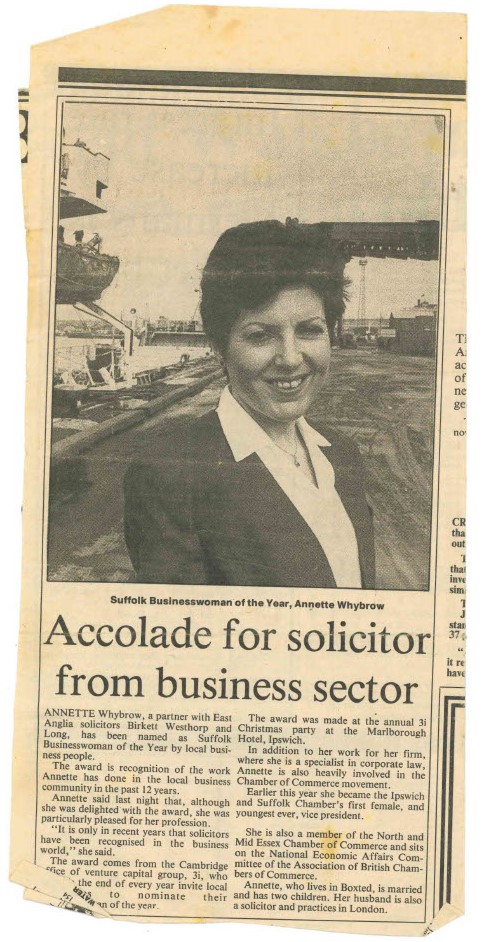
By 1994, Annette had risen to the presidency of the Chamber, a role that came with significant responsibilities and challenges.
Annette emphasised the importance of international trade, particularly with European markets, as the Chamber worked to support local businesses in import and export activities. She highlighted the Chamber’s role in authorising trade documentation through its export certification services. This is a vital service for businesses engaged in international trade, and one the Suffolk Chamber continues to provide today.
A highlight of her presidency was the 110th anniversary of the Suffolk Chamber of Commerce. Annette recalled the prestigious dinner to mark the occasion. Alongside a host of representatives from regional chambers, representatives were also invited from across Europe. One such guest was Andriano Anotelli from the Trento Chamber of Commerce in Italy, showcasing the significance of the Chamber’s international reach.
A time of Economic Turbulence
Annette spoke at length about the Chamber’s lobbying power and reach into central government.
During her presidency, she engaged with national leaders to advocate for the Suffolk business community, such as a significant meeting with the Prime Minister, John Major. It was at this meeting that Annette highlighted the challenges faced by Suffolk businesses amidst the economic difficulties of the early 1990s.
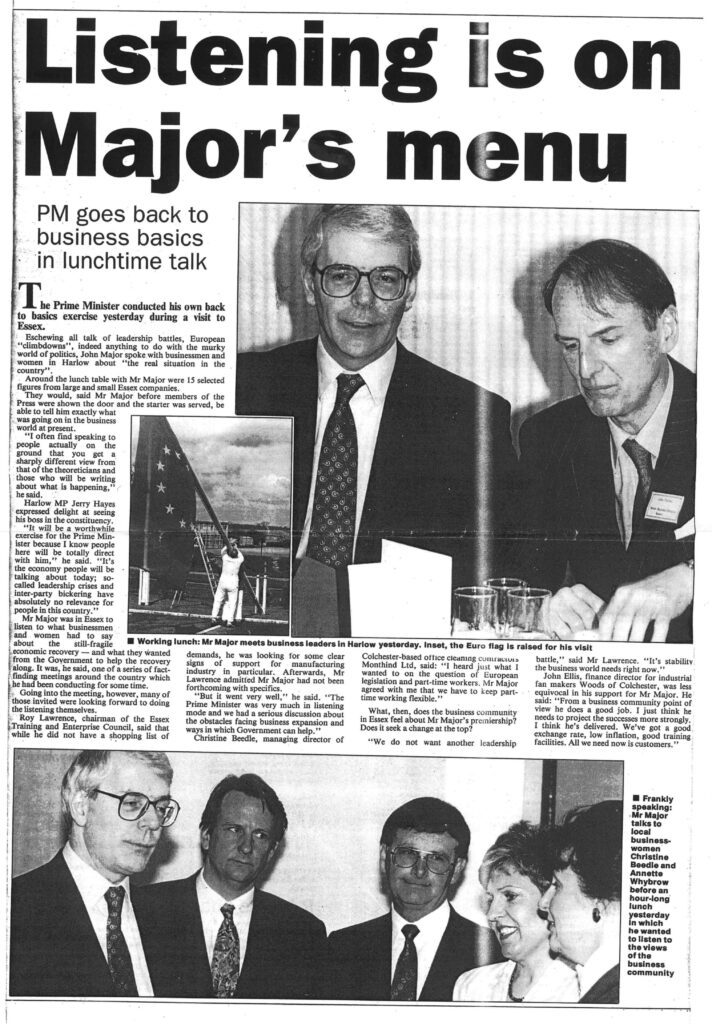
Her role on the National Economic Affairs Committee of the Association of British Chambers of Commerce provided another frontier on which Annette could represent the interests of the Suffolk business community on a national level. This position enabled her to bring valuable insights into national economic trends and policy developments. These insights could then be used to benefit the Chamber and wider business community.
More broadly, the Chamber met the economic turbulence of the 1990s, reminiscent of the current economic climate, with determination.
The Suffolk Chamber remained steadfast in their support for the business community, running a regular meeting of the Home and Economics committee. Chaired by Annette, this committee collated vital information on the economic situation, and provided support for Suffolk businesses.
A feminist pioneer
As we talked, Annette joked about her role as a female pioneer, and it became clear in our conversation she very much was one. Her career began in the 1970s – an era which witnessed a series of legislations around gender that transformed women’s rights in the UK, including the Equal Pay Act (1970) and the Sex Discrimination Act (1975). It was also the decade in which Britain saw its first female Prime Minister, Margaret Thatcher, marking a significant shift for women in public life and work.
Annette spoke amusedly of the drastic differences women faced at this time.
“I remember being one of the first people in a bar in London, where only a man could go up to the bar…with the passing of the Equal Opportunities Act, this was unlawful. So three of us, three girls, went up to the bar and ordered a drink. A big thing, wasn’t it?”
During her time at the Chamber, the Suffolk Equality Exchange Network (SEEN) was established. The group met to address the lack of equal opportunity activities in East Anglia. Activities and workshops were launched as part of the initiative, covering topics such as workplace harassment to exploring issues around racial equality.
Alongside her legal career and role on the executive committee of the Suffolk Chamber, Annette was involved in a variety of other county organisations. These included Suffolk Wildlife Trust and Suffolk College, reflecting her broad commitment to the community and a marker of her fantastic ambition.
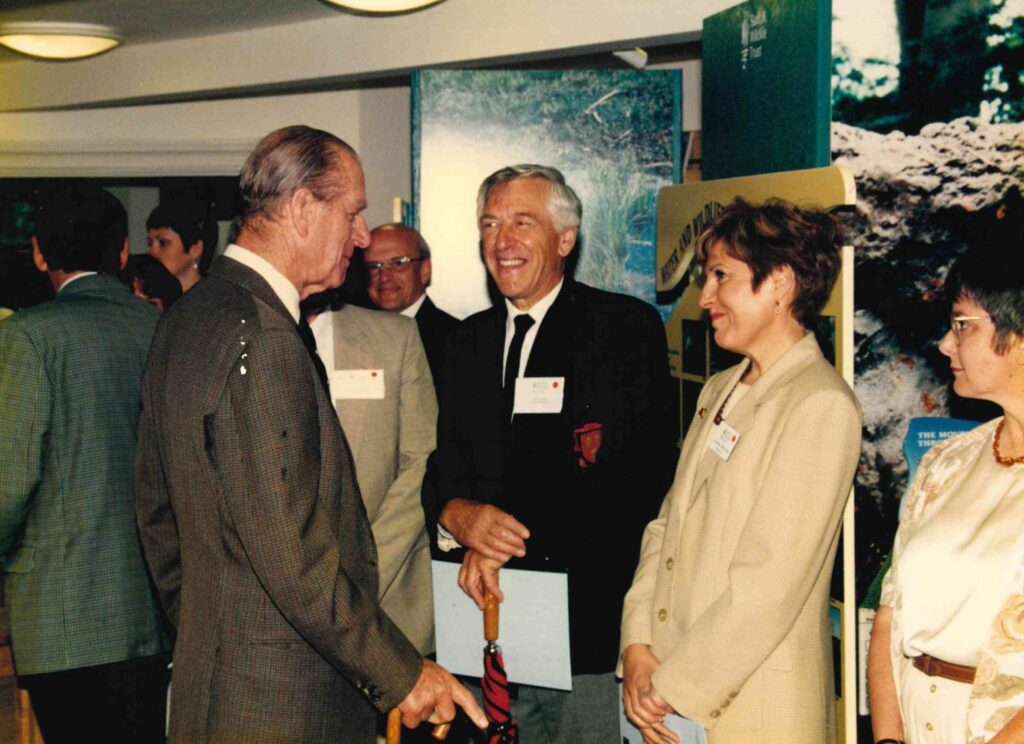
Reflections on her time at the Suffolk Chamber
Reflecting on her time as president, Annette underscored the importance of improving the Chamber’s profile and making it relevant to all sectors of the business community. She believed strongly in the Chamber’s role as a business networking centre that could influence local policies and support economic development in the county.
Annette Whybrow’s tenure as the first woman president of the Suffolk Chamber of Commerce stands as a testament to her pioneering spirit, dedication to gender equality, and commitment to the business community. Her leadership not only broke new ground for women in business but also strengthened the Chamber’s role as a vital player, both on a local and national stage.
With thanks to Annette Whybrow for sharing her inspiring story with the Suffolk Chamber’s C140 project—honouring 140 years, shaping tomorrow, and celebrating diversity.
